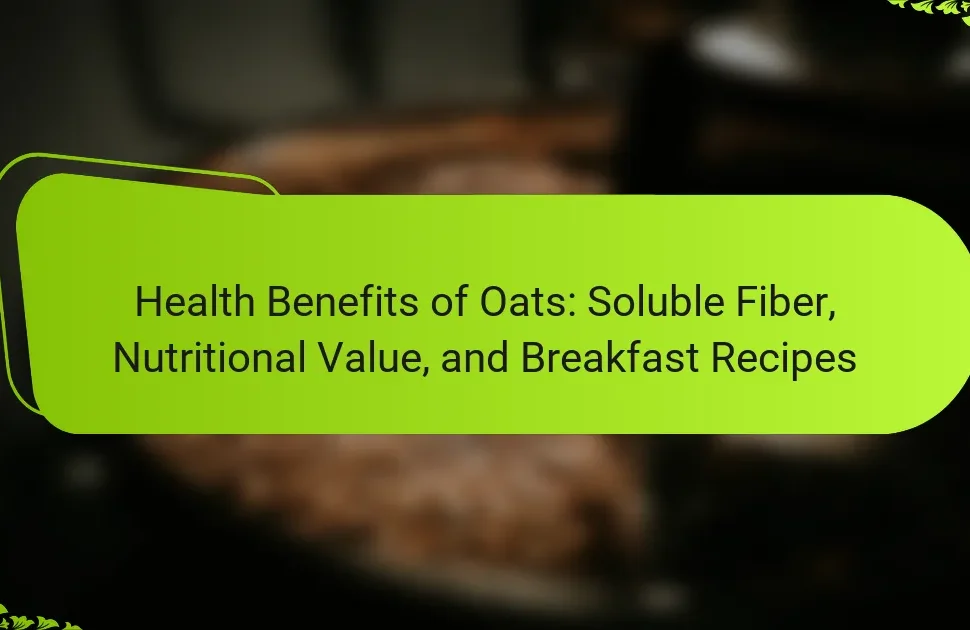
What are the Health Benefits of Sweet Potatoes?
Sweet potatoes offer numerous health benefits. They are rich in vitamins A and C, which support immune function and skin health. Sweet potatoes contain dietary fiber, aiding digestion and promoting gut health. They have a low glycemic index, making them suitable for blood sugar management. Additionally, sweet potatoes are high in antioxidants, which help combat oxidative stress. Research indicates that their consumption may reduce the risk of chronic diseases. Their potassium content supports heart health by regulating blood pressure. Overall, sweet potatoes are a nutrient-dense food choice for a balanced diet.
How do sweet potatoes contribute to overall health?
Sweet potatoes contribute to overall health by providing essential nutrients and antioxidants. They are rich in vitamins A, C, and B6, which support immune function and skin health. Sweet potatoes contain dietary fiber, aiding digestion and promoting gut health. They have a low glycemic index, helping to regulate blood sugar levels. The presence of antioxidants like beta-carotene may reduce the risk of chronic diseases. Research indicates that the high potassium content supports cardiovascular health. Additionally, sweet potatoes are versatile in cooking, making them easy to incorporate into various diets.
What specific vitamins are found in sweet potatoes?
Sweet potatoes contain several specific vitamins. They are particularly rich in vitamin A, primarily in the form of beta-carotene. This vitamin is essential for maintaining healthy vision and immune function. Sweet potatoes also provide vitamin C, which supports the immune system and skin health. Additionally, they contain vitamin B6, important for brain health and metabolism. Folate, another vitamin found in sweet potatoes, plays a crucial role in DNA synthesis and repair. These vitamins contribute significantly to the nutritional profile of sweet potatoes, making them a valuable food source.
How do these vitamins benefit the body?
Vitamins from sweet potatoes benefit the body in several ways. Vitamin A supports vision and immune function. It helps maintain healthy skin and mucous membranes. Vitamin C acts as an antioxidant. It aids in collagen production and boosts the immune system. Vitamin B6 supports brain health and metabolism. It helps in the production of neurotransmitters. Folate, another B vitamin, is essential for DNA synthesis and repair. It plays a crucial role in cell division and growth. These vitamins collectively contribute to overall health and well-being.
What minerals are present in sweet potatoes?
Sweet potatoes contain several essential minerals. These include potassium, magnesium, and calcium. Potassium is vital for heart health and muscle function. Magnesium supports bone health and energy production. Calcium is important for strong bones and teeth. In addition, sweet potatoes also provide iron, which is crucial for oxygen transport in the blood. Manganese is another mineral found in sweet potatoes, aiding in metabolism and antioxidant defense. Collectively, these minerals contribute to the nutritional benefits of sweet potatoes.
How do these minerals support bodily functions?
Minerals in sweet potatoes support bodily functions by facilitating various biochemical processes. Potassium regulates fluid balance and muscle contractions. Magnesium aids in energy production and supports nerve function. Calcium is essential for bone health and muscle function. Iron is crucial for oxygen transport in the blood. Zinc supports immune function and wound healing. Each mineral plays a unique role in maintaining overall health. For example, potassium intake is linked to lower blood pressure, as noted by the American Heart Association. Magnesium deficiency can lead to muscle cramps and fatigue, highlighting its importance in energy metabolism.
What role do antioxidants in sweet potatoes play in health?
Antioxidants in sweet potatoes play a significant role in promoting health. They help neutralize harmful free radicals in the body. This action reduces oxidative stress, which is linked to chronic diseases. Sweet potatoes are rich in beta-carotene, a powerful antioxidant. Beta-carotene converts to vitamin A, essential for immune function and vision. Studies show that diets high in antioxidants support heart health and lower cancer risk. Furthermore, antioxidants in sweet potatoes may improve skin health by protecting against UV damage. Overall, the antioxidants found in sweet potatoes contribute to overall well-being and disease prevention.

How Can Sweet Potatoes Be Prepared for Maximum Health Benefits?
Sweet potatoes can be prepared for maximum health benefits through steaming, baking, or roasting. These cooking methods preserve nutrients better than boiling. Steaming sweet potatoes retains more vitamins, especially vitamin C and B vitamins. Baking enhances the flavor without adding unhealthy fats. Roasting caramelizes natural sugars, making them more palatable while maintaining fiber content. Avoid frying, as it adds unnecessary calories and fats. Research shows that cooking sweet potatoes increases their antioxidant levels, making them more beneficial.
What are the best cooking methods for sweet potatoes?
The best cooking methods for sweet potatoes include baking, boiling, steaming, and roasting. Baking sweet potatoes at 400°F for 45-60 minutes enhances their natural sweetness. Boiling sweet potatoes takes about 20 minutes and retains most nutrients. Steaming is another healthy option, preserving vitamins and minerals while taking around 30 minutes. Roasting sweet potatoes at 425°F for 25-30 minutes creates a caramelized flavor. Each method offers unique textures and tastes, making sweet potatoes versatile in various dishes.
How does boiling compare to baking in nutrient retention?
Boiling results in greater nutrient loss compared to baking. When sweet potatoes are boiled, water-soluble vitamins, such as vitamin C and certain B vitamins, leach into the cooking water. Studies indicate that boiling can cause a nutrient loss of up to 50% for these vitamins. In contrast, baking retains more nutrients as it involves less water and lower temperatures. Research shows that baking retains about 90% of the vitamin C content in sweet potatoes. Thus, baking is generally the better method for preserving nutrients in sweet potatoes.
What are the benefits of steaming sweet potatoes?
Steaming sweet potatoes retains their nutrients better than boiling. This method preserves vitamins A and C, which are vital for immune function and skin health. Steamed sweet potatoes have a lower glycemic index compared to baked ones. This means they cause a slower rise in blood sugar levels. Steaming also enhances the natural sweetness of sweet potatoes. It results in a creamy texture that many find appealing. Additionally, steaming reduces the need for added fats or oils, making it a healthier cooking method. Overall, steaming is an effective way to maximize the nutritional benefits of sweet potatoes.
What are some popular recipes featuring sweet potatoes?
Popular recipes featuring sweet potatoes include sweet potato fries, mashed sweet potatoes, and sweet potato casserole. Sweet potato fries are often baked or fried until crispy. They are seasoned with salt and spices for flavor. Mashed sweet potatoes are made by boiling and mashing the tubers. Butter, cream, or spices can be added for richness. Sweet potato casserole is a traditional dish, especially during holidays. It typically combines mashed sweet potatoes with brown sugar and marshmallows. Other recipes include sweet potato soup and roasted sweet potatoes. Each recipe highlights the natural sweetness and versatility of sweet potatoes.
How can sweet potatoes be incorporated into breakfast dishes?
Sweet potatoes can be incorporated into breakfast dishes in various ways. They can be mashed and spread on toast for a nutritious topping. Sweet potato pancakes are a popular choice, offering a sweet flavor and fluffy texture. Additionally, diced sweet potatoes can be roasted and added to breakfast burritos or omelets. Sweet potato hash is another option, combining diced sweet potatoes with vegetables and eggs. Smoothies can also include cooked sweet potatoes for added creaminess and nutrients. These methods enhance the nutritional profile of breakfast while providing a delicious taste.
What are some creative sweet potato side dishes for dinner?
Creative sweet potato side dishes include sweet potato fries, mashed sweet potatoes, and sweet potato casserole. Sweet potato fries are crispy and can be seasoned with various spices. Mashed sweet potatoes can be enriched with butter and herbs for added flavor. Sweet potato casserole often features a crunchy topping of pecans or marshmallows. Other options are roasted sweet potatoes with garlic and rosemary or sweet potato salad mixed with black beans and corn. These dishes provide a nutritious and flavorful complement to any dinner.

What Unique Attributes Make Sweet Potatoes Stand Out?
Sweet potatoes stand out due to their unique nutritional profile and versatility. They are rich in beta-carotene, which the body converts to vitamin A. This vitamin is essential for vision, immune function, and skin health. Sweet potatoes also contain high levels of dietary fiber, promoting digestive health. Their low glycemic index makes them suitable for blood sugar management. Additionally, they are a source of antioxidants, which help combat oxidative stress. The variety of colors, including orange, purple, and white, indicates different phytonutrients. Each color offers distinct health benefits, enhancing their appeal. Sweet potatoes can be prepared in various ways, including baking, boiling, and frying, adding to their culinary versatility.
Why are sweet potatoes considered a superfood?
Sweet potatoes are considered a superfood due to their high nutritional value. They are rich in vitamins A, C, and B6. A medium sweet potato contains over 400% of the daily recommended intake of vitamin A. This vitamin is essential for eye health and immune function. Sweet potatoes also provide significant amounts of dietary fiber, promoting digestive health. Additionally, they contain antioxidants that combat oxidative stress. Studies indicate that their low glycemic index helps regulate blood sugar levels. These attributes collectively contribute to their classification as a superfood.
What unique phytonutrients do sweet potatoes contain?
Sweet potatoes contain unique phytonutrients such as anthocyanins and beta-carotene. Anthocyanins are responsible for the purple color in some varieties. They have antioxidant properties that may reduce inflammation and lower the risk of chronic diseases. Beta-carotene is a precursor to vitamin A, essential for vision and immune function. Sweet potatoes also provide phenolic compounds, which contribute to their antioxidant capacity. These phytonutrients enhance the nutritional profile of sweet potatoes, making them beneficial for health.
How do the varieties of sweet potatoes differ in health benefits?
Different varieties of sweet potatoes offer varying health benefits. Orange-fleshed sweet potatoes are rich in beta-carotene, which supports eye health. Purple sweet potatoes contain anthocyanins, known for their antioxidant properties. White-fleshed sweet potatoes have a milder flavor and are lower in sugar. Each variety also has distinct fiber content, impacting digestive health. Research indicates that the nutritional profile varies significantly, with some varieties providing more vitamins and minerals than others. For instance, orange sweet potatoes can provide over 400% of the daily value of vitamin A. These differences make it important to choose the right variety for specific health goals.
What are some rare health benefits of sweet potatoes?
Sweet potatoes offer rare health benefits, including their potential to improve gut health and enhance skin appearance. The high fiber content in sweet potatoes supports a healthy gut microbiome. This can lead to better digestion and nutrient absorption. Additionally, sweet potatoes are rich in beta-carotene, which may contribute to healthier skin by promoting a youthful appearance. The antioxidant properties of beta-carotene help combat oxidative stress. Furthermore, sweet potatoes contain anthocyanins, which have been linked to reduced inflammation. This can support overall health and may lower the risk of chronic diseases.
How can sweet potatoes aid in weight management?
Sweet potatoes can aid in weight management due to their high fiber content and low calorie density. They contain approximately 3.0 grams of fiber per 100 grams. This fiber promotes satiety, helping individuals feel full longer. Additionally, sweet potatoes have a low glycemic index, which stabilizes blood sugar levels. Stable blood sugar can reduce cravings and prevent overeating. Their nutrient density provides essential vitamins and minerals without excessive calories. For example, sweet potatoes are rich in vitamin A, which supports overall health. A study published in the Journal of Nutrition found that high-fiber foods contribute to weight loss and maintenance. Thus, incorporating sweet potatoes into a diet can support weight management effectively.
What is the impact of sweet potatoes on blood sugar levels?
Sweet potatoes have a moderate impact on blood sugar levels. They contain complex carbohydrates that digest slowly, which helps prevent spikes in blood glucose. The fiber content in sweet potatoes also contributes to better blood sugar control. Research indicates that consuming sweet potatoes can lead to lower post-meal blood sugar levels. A study published in the Journal of Nutrition found that sweet potatoes improve insulin sensitivity. This effect is beneficial for individuals managing diabetes or prediabetes. Overall, sweet potatoes can be a healthy carbohydrate choice for stable blood sugar levels.
What tips can enhance the health benefits of sweet potatoes in your diet?
To enhance the health benefits of sweet potatoes, incorporate them into a balanced diet. Pair sweet potatoes with healthy fats, like olive oil or avocado. This combination improves the absorption of fat-soluble vitamins. Cooking methods also matter; baking or steaming retains more nutrients compared to boiling. Additionally, consume sweet potatoes with protein sources, such as beans or lean meats, for a complete meal. Including spices like cinnamon can further enhance their antioxidant properties. Lastly, choose organic sweet potatoes to minimize pesticide exposure. These practices collectively maximize the nutritional value of sweet potatoes in your diet.
How can you store sweet potatoes for optimal freshness?
Store sweet potatoes in a cool, dark, and well-ventilated area. Ideal storage temperatures range from 55°F to 60°F. Avoid refrigeration, as cold temperatures can alter their flavor and texture. Place them in a breathable container, such as a basket or a paper bag, to prevent moisture buildup. Check sweet potatoes regularly for any signs of spoilage. Discard any that show signs of rot or sprouting. Proper storage can extend their freshness for several weeks.
What are some common mistakes to avoid when cooking sweet potatoes?
Common mistakes to avoid when cooking sweet potatoes include overcooking them. Overcooking can lead to a mushy texture and loss of nutrients. Another mistake is not washing the sweet potatoes before cooking. Washing removes dirt and pesticides. Additionally, some people peel sweet potatoes unnecessarily. The skin contains valuable nutrients and fiber. Using high heat can also be problematic. High heat may cause the outside to burn while the inside remains undercooked. Lastly, not seasoning adequately can result in bland flavor. Proper seasoning enhances the natural sweetness of sweet potatoes.
The main entity of this article is sweet potatoes, which are highlighted for their numerous health benefits. The article covers their rich nutritional profile, including essential vitamins such as A, C, and B6, as well as important minerals like potassium and magnesium. It discusses the role of antioxidants in reducing oxidative stress and chronic disease risk, while also outlining various cooking methods that maximize their health benefits. Additionally, the article provides insights into how sweet potatoes can aid in weight management and blood sugar control, along with tips for optimal storage and preparation.




